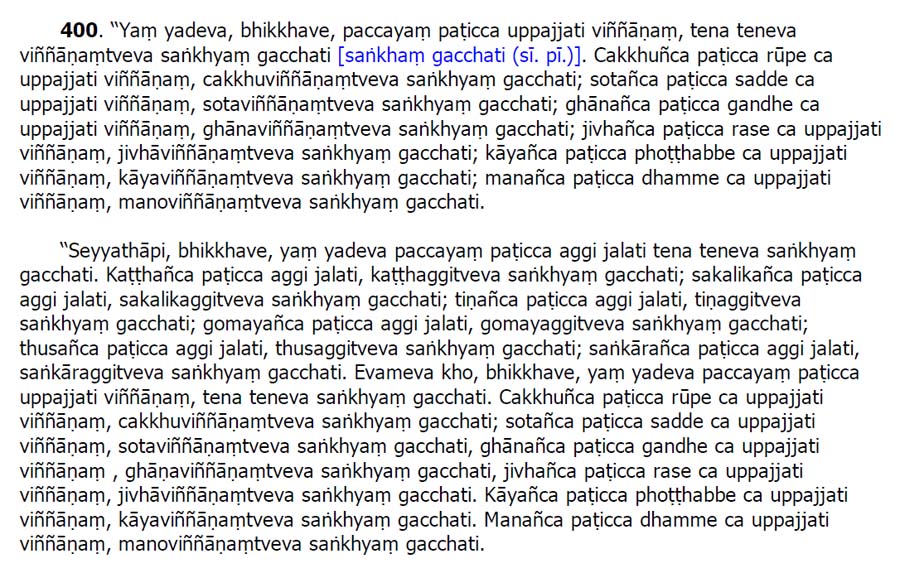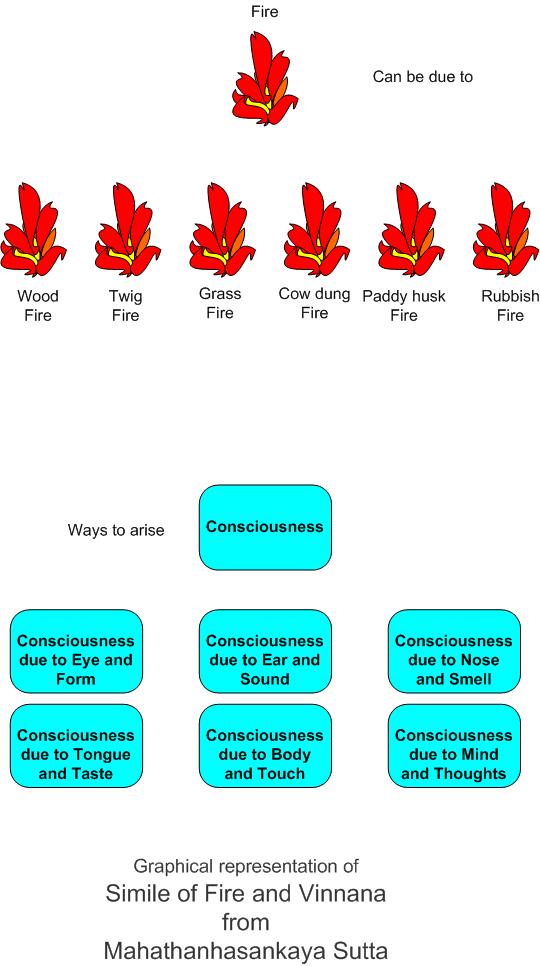
insight by www.buddhaviews.com The Practicing Dhamma expounder for today

insight by www.buddhaviews.com The Practicing Dhamma expounder for today
Learning Dhamma in a small way
The consciousness of human beings was greatly discussed by Gautama Buddha and much references and explanations can be found in many Sutta Discourses. Buddha referred 'consciousness' as vinnana in his discourses.
The meaning of vinnana or consciousness according to Lord Buddha's discourses
is ‘getting to know’.
It is getting to know about different colors and shapes, different sounds,
different smells, different tastes, different bodily contacts or touches
and different thoughts.
The vinnana can arise due to eye sense base, ear sense base, nose sense
base, tongue sense base, body sense base and mind sense base.
To understand about vinnana or consciousness, the explanation given by
Gautama Buddha in the discourse Mahatanhasankhaya Sutta, can be regarded
very important. For easy understanding The Blessed One stated this simile
of Fire.
Fire is named after whatever it is burned on. For example
A fire ablaze with wood is called wood fire.
A fire ablaze with twigs is called twig fire.
A fire ablaze with grass is called grass fire.
A fire ablaze with cow dung is called cow dung fire.
A fire ablaze with paddy husk is called paddy husk fire.
A fire ablaze with rubbish is called rubbish fire.
In all these instances it is the ‘Fire’ that burned on and
the fire was caused by different ingredients.
Like the
fire that was burned due to wood, consciousness that arises due to eye
is eye consciousness.
Like the fire that was burned due to twig, consciousness that arises due
to ear is the ear consciousness.
Like the fire that was burned due to grass, consciousness that arises
due to nose is the nose consciousness.
Like the fire that was burned due to cow dung, consciousness that arises
due to tongue is the tongue consciousness.
Like the fire that was burned due to paddy husk, consciousness that arises
due to body is the body consciousness.
Like the fire that was burned due to rubbish, consciousness that arises
due to mind is the mind consciousness.
The importance of the manasikara or attention is vital in above mentioned
six instances since manasikara, initiates the inner sense base to focus
on the outer sense base. With this combination the consciousness or vinnana
arises .Simply said, the manasikara is needed for the consciousness to
arise in the six inner sense bases. We need to understand that the vinnana
is a result of a causal effect.
| Inner Sense Base | Outer Sense Base | |
| Eye | that corresponds to | Form |
| Ear | that corresponds to | Sound |
| Nose | that corresponds to | Smell |
| Tongue | that corresponds to | Taste |
| Body | that corresponds to | Touch (tactile) |
| Mind | that corresponds to | Thoughts |
Eye consciousness arises due to Form. An effort from the mind (manasikara) helps the Eye to have attention on the Form that comes to the Eyes. With this sequence, the Eye consciousness occurs.
Ear consciousness arises due to Sound. An effort from the mind (manasikara)
helps the Ear to have attention on the Sound that comes to the Ears. With
this sequence, the Ear consciousness occurs.
Nose consciousness arises due to Smell. An effort from the mind (manasikara) helps the Nose to have attention on the Smell that comes to the Nose. With this sequence, the Nose consciousness occurs.
Tongue consciousness arises due to Taste. An effort from the mind (manasikara) helps the Tongue to have attention on the Taste that comes to the Tongue. With this sequence, the Tongue consciousness occurs.
Body consciousness arises due to Touch or tactile sensation. An effort
from the mind (manasikara) helps the Body to have attention on the Touch
that comes to the Body. With this sequence, the Body consciousness occurs.
Mind consciousness arises due to Thoughts. An effort from the mind (manasikara)
helps the Mind to have attention on the Thoughts that comes to the Mind.
With this sequence, the Mind consciousness occurs.
The salient points to understand here is that vinnana occurs due to six
organs within us. They are called the six inner sense bases. There are
six outer sense bases which corresponds to the six inner sense bases.
Due to minds attention focused on an inner sense base which focuses on
the corresponding outer sense base, consciousness is said to be arisen.
So we can understand that the consciousness arises dependently. This is
a very important statement since it states that 'vinnana' is dependent
oriented and a permanent vinnana cannot exist.
Gautama Buddha’s explanation of vinnana is of utmost importance
since understanding it properly would help to understand Dhamma correctly
thus also enabling to grasp many other aspects of Gautama Buddha's Teachings.
An
excerpt from Mahatanhasankhaya Sutta - Pali English

An excerpt from Mahatanhasankhaya Sutta - Pali Sinhala

Excerpt from www.tipitaka.com
Graphical representation of simile of Fire and Vinnana from Mahatanhasankhaya sutta
